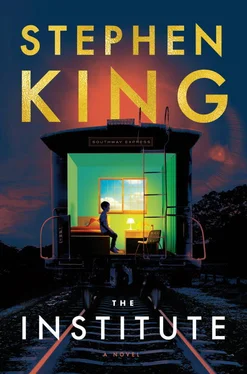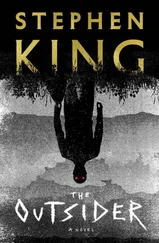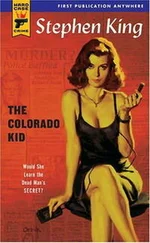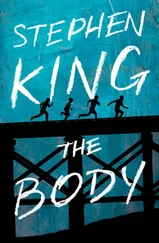“Sure,” Michelle said. “Whatever you want.”
She saw the beginnings of alarm in the boy’s eyes, saw him open his mouth to say something else. She held her breath and triggered the aerosol can two inches from his face. He went out like a light. They always did, and there was never a hangover when they woke up six or eight hours later. Better living through chemistry, Michelle thought, and counted seven… eight… nine.
On ten, Denny and Robin entered Herb and Eileen’s room. The first thing they saw was a problem: the woman wasn’t in bed. The door to the bathroom was open, casting a trapezoid of light on the floor. It was too bright for the goggles. They stripped them off and dropped them. The floor in here was polished hardwood, and the double clack was clearly audible in the silent room.
“Herb?” Low, from the bathroom. “Did you knock over your water glass?”
Robin advanced to the bed, taking her Glock from the waistband of her slacks at the small of her back while Denny walked to the bathroom door, making no attempt to muffle his footfalls. It was too late for that. He stood beside it, gun raised to the side of his face.
The pillow on the woman’s side was still indented from the weight of her head. Robin put it over the man’s face and fired into it. The Glock made a low coughing sound, no more than that, and discharged a little brown smut onto the pillow from its vents.
Eileen came out of the bathroom, looking worried. “Herb? Are you all r—”
She saw Denny. He seized her by the throat, put the Glock to her temple, and pulled the trigger. There was another of those low coughing sounds. She slid to the floor.
Meanwhile, Herb Ellis’s feet were kicking aimlessly, making the coverlet he and his late wife had been sleeping under puff and billow. Robin fired twice more into the pillow, the second shot a bark instead of a cough, the third one even louder.
Denny took the pillow away. “What, did you see The Godfather too many times? Jesus, Robin, his head’s halfway gone. What’s an undertaker supposed to do with that?”
“I got it done, that’s what matters.” The fact was, she didn’t like to look at them when she shot them, the way the light went out of them.
“You need to man up, girl. That third one was loud. Come on.”
They picked up the goggles and went down to the boy’s room. Denny hoisted Luke into his arms—no problem there, the kid didn’t weigh more than ninety pounds—and gave his chin a jerk for the women to go ahead of him. They left the way they had come, through the kitchen. There were no lights on in the adjacent house (even the third shot hadn’t been that loud), and no soundtrack except for the crickets and a faraway siren, maybe all the way over in St. Paul.
Michelle led the way between the two houses, checked the street, and motioned for the others to come ahead. This was the part Denny Williams hated. If some guy with insomnia looked out and saw three people on his neighbor’s lawn at two in the morning, that would be suspicious. If one of them was carrying what looked like a body, that would be very suspicious.
But Wildersmoot Drive—named after some long-gone Twin Cities bigwig—was fast asleep. Robin opened the SUV’s curbside back door, got in, and held out her arms. Denny handed the boy in and she pulled Luke against her, his head lolling on her shoulder. She fumbled for her seatbelt.
“Uck, he’s drooling,” she said.
“Yes, unconscious people do that,” Michelle said, and closed the rear door. She got in the shotgun seat and Denny slid back behind the wheel. Michelle stowed the guns and the aerosol as Denny cruised slowly away from the Ellis house. As they approached the first intersection, Denny put the headlights back on.
“Make the call,” he said.
Michelle punched in the same number. “This is Ruby Red. We have the package, Jerry. Airport ETA in twenty-five minutes. Wake up the system.”
In the Ellis home, the alarms came back on. When the police finally arrived, they would find two dead, one gone, the kid the most logical suspect. He was said to be brilliant, after all, and those were the ones that tended to be a little wonky, weren’t they? A little unstable? They’d ask him when they found him, and finding him was only a matter of time. Kids could run, but even the brilliant ones couldn’t hide.
Not for long.
Luke woke up remembering a dream he’d had—not exactly a nightmare, but definitely of the not-so-nice variety. Some strange woman in his room, leaning over his bed with her blond hair hanging around the sides of her face. Sure, whatever you want , she’d said. Like a chick in one of the porno clips he and Rolf sometimes watched.
He sat up, looked around, and at first thought this was another dream. It was his room—same blue wallpaper, same posters, same bureau with his Little League trophy on it—but where was the window? His window looking out at Rolf’s house was gone.
He shut his eyes tight, then sprang them open. No change; the windowless room remained windowless. He considered pinching himself, but that was such a cliché. He popped his fingers against his cheek instead. Everything stayed the same.
Luke got out of bed. His clothes were on the chair, where his mom had put them the night before—underwear, socks, and tee-shirt on the seat, jeans folded over the back. He put them on slowly, looking at where the window should have been, then sat down to put on his sneakers. His initials were on the sides, LE, and that was right, but the middle horizontal stroke of the Ewas too long, he was sure of it.
He turned them over, looking for street grit, and saw none. Now he was completely sure. These were not his sneaks. The laces were wrong, too. They were too clean. Nevertheless, they fit perfectly.
He went to the wall and laid his hands against it, pressing, feeling for the window underneath the wallpaper. It wasn’t there.
He asked himself if maybe he’d gone crazy, just snapped, like a kid in a scary movie written and directed by M. Night Shyamalan. Weren’t kids with high-functioning minds supposed to be prone to breakdowns? But he wasn’t crazy. He was as sane as he’d been last night when he went to sleep. In a movie, the crazy kid would think he was sane—that would be the Shyamalan twist—but according to the psychology books Luke had read, most crazy people understood they were crazy. He wasn’t.
As a little kid (five as opposed to twelve), he’d gone through a craze of collecting political buttons. His dad had been happy to help him build his collection, because most of the buttons were really cheap on eBay. Luke had been especially fascinated (for reasons he could not explain, even to himself) with the buttons of presidential candidates who had lost. The fever had eventually passed, and most of the buttons were probably stored in the attic crawlspace or in the cellar, but he had saved one as a kind of good-luck talisman. It had a blue plane on it, surrounded by the words WINGS FOR WILLKIE. Wendell Willkie ran for president against Franklin Roosevelt in 1940 but lost badly, winning only ten states for a total of eighty-two electoral votes.
Luke had put the button in the cup of his Little League trophy. He fished for it now and came up with nothing.
Next, he went to the poster showing Tony Hawk on his Birdhouse deck. It looked right, but it wasn’t. The small rip on the lefthand side was gone.
Not his sneakers, not his poster, Willkie button gone.
Not his room.
Something began to flutter in his chest, and he took several deep breaths to try and quiet it. He went to the door and grasped the knob, sure he would find himself locked in.
Читать дальше







